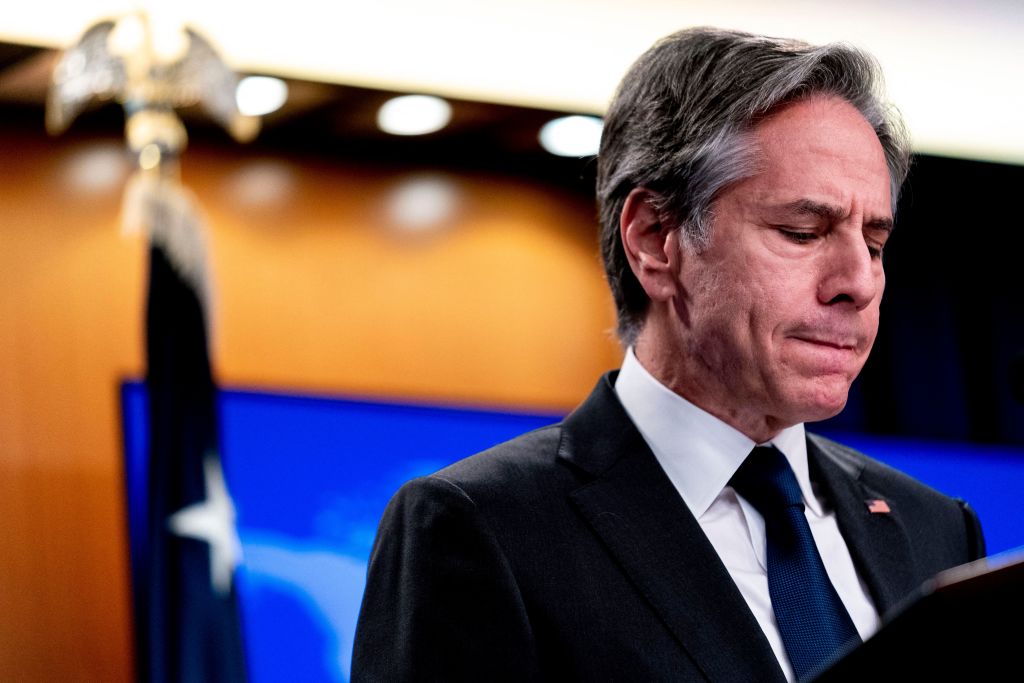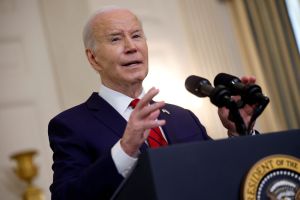Sloganeering on the world stage
When is a foreign policy not a foreign policy? When it’s a slogan. In his piece for the January issue of The Spectator, Christopher Caldwell argues that the Biden administration is conducting marketing rather than diplomacy on the world stage. Its main catchphrase is “America is back.”
Caldwell likens Biden to Charlie Wales, the hero of F. Scott Fitzgerald’s short story “Babylon Revisited”: “Charlie returns to Paris after the stock-market crash. ‘He was not really disappointed to find Paris was so empty,’ Fitzgerald writes. ‘But the stillness in the Ritz bar was strange and portentous. It was not an American bar any more — he felt polite in it, and not as if he owned it. It had gone back into France.’ Like America, Charlie is ‘back,’ but not in such a way as to impose his whims on foreigners.”
The limits of slogans, the trouble with being “back”, and the inability to impose US whims on foreigners. All of these things are on display in the Biden administration’s talks with Vladimir Putin. That’s not to say that the standoff over Ukraine is straightforward. But it’s hard to shake the feeling that the US, and the West, is being outmaneuvered by the Russian leader.
That is the conclusion that Walter Russell Mead comes to in the Wall Street Journal. “Until Western leaders emerge from the mists of post-historical illusion and recover the lost art of effective foreign policy,” he writes, “he will continue to make gains at our expense.”
When asked a difficult question about foreign policy, Team Biden seems content to stick with the illusions. Yesterday, White House spokesperson Jen Psaki was asked an innocuous question on how the Iran talks were progressing. After a pro forma update she launched into an attack of Biden’s predecessor: “Most importantly, none of the things we’re looking at now — Iran’s increased capability and capacity, their aggressive actions that they have taken through proxy wars around the world — would be happening if the former president had not recklessly pulled out of the nuclear deal with no thought as to what might come next.”
Fantasyland.
It reminded me of Antony Blinken’s claims about Nord Stream 2. If asked about the Russian-owned gas pipeline, which increases Europe’s energy dependency on Russia, Blinken likes to claim that Nord Steam 2 will be “a source of leverage on Russia because to the extent President Putin wants to see gas flowing through that pipeline,” as he put it in December.
Again, fantasyland. And a strange line of reasoning for an administration at least in theory opposed to the pipeline — even if it doesn’t support the relevant sanctions.
Uniting the administration’s shallow slogans, glib press conference answers and topsy-turvy logic on Nord Stream is a reluctance to have a hard-nosed conversation about American power: how to wield it and to what end. Instead, the administration takes comfort in soft-power niceties and outdated invocations of rules-based international order.
Paradoxically, the administration’s greatest foreign policy failing so far — the withdrawal from Afghanistan — was accompanied by a searingly honest rationale. Afghanistan is, among other things, a reminder of what happens when slogans go untested and lies about the world are allowed to fester. Unless Biden officials stop believing the fictions they tell themselves about the world, other humiliating failures, served with a side order of hard-to-swallow truths, will surely follow.
*** Sign up to receive the DC Diary in your inbox on weekdays ***
Schumer’s cunning plan
Politico reports that Chuck Schumer has revealed his “endgame” for the clash over the filibuster and voting reform. The Senate majority leader will use congressional rules to evade an initial GOP filibuster. He is yet to indicate when a vote will take place, though he has vowed that it will be before Monday, which is Martin Luther King Jr. Day.
“The Senate will finally debate voting rights legislation, and then every senator will be faced with a choice of whether or not to pass the legislation to protect our democracy,” Schumer wrote in a memo to colleagues obtained by Politico.
As with Biden’s uncompromising (and dishonest) speech on the subject on Tuesday, these words read as a desperate threat rather than the guidance of someone in the middle of delicate negotiations.
Harris won’t give a straight answer on 2024
“Are we going to see the same Democratic ticket in 2024?” That was the cleverly phrased question NBC’s Craig Melvin put to Kamala Harris in a clip from an interview that airs in full tomorrow. After a long pause, the vice president utters a series of words. “Yes” is not one of them.
A car-crash poll for Biden
There are bad poll numbers and then there are bad poll numbers. With all the usual caveats about it just being one survey and so on, the latest Quinnipiac poll results will be satisfying reading for political rubberneckers, for they suggest a car crash of a presidency. Biden’s approval rating languishes at 33 percent. Just 34 percent approve of the job he is doing on the economy, 35 percent on foreign policy and 39 percent on the response to the coronavirus. Of the president who promised to be the unifier, 49 percent, a plurality, say he is doing more to divide the country. Ouch.
What you should be reading today
Christopher Caldwell: Back in the USA
Amber Athey: I’m a Covid conspiracy theorist
Dan Negrea: China is the new evil empire
John McCormack, National Review: What is Biden thinking?
Kyle Kondik and J. Miles Coleman, Sabato’s Crystal Ball: House Republicans’ drive to 35
Greg Ip, Wall Street Journal: Is inflation a microeconomic problem? That’s what the White House is betting
Poll watch
President Biden Job Approval
Approve: 41.9 percent
Disapprove: 53.1 percent
Net approval: -11.2 (RCP Average)
2022 Generic Congressional Ballot
Republicans: 44 percent
Democrats: 43 percent (Quinnipiac)


















